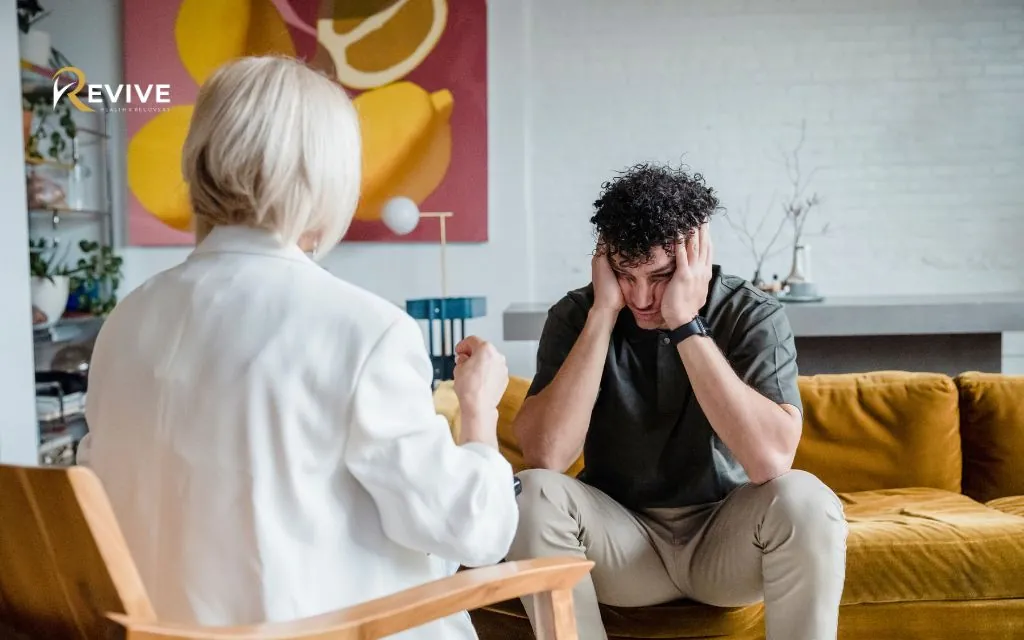Living with depression in the vibrant city of Denver doesn’t have to be your reality. Whether you’re struggling with persistent sadness, loss of interest in activities you once enjoyed, or feeling overwhelmed by daily life, professional depression therapy can provide the support and tools you need to reclaim your mental wellness. Denver offers numerous treatment options, but finding the right therapist and approach is crucial for your healing journey.
At Revive Health Recovery Center, we understand that each person’s experience with depression is unique, which is why we provide personalized, evidence-based therapy designed specifically for your needs. Our compassionate team of licensed professionals is committed to helping you navigate through depression and rediscover hope, purpose, and joy in your life.
Understanding Depression and Its Impact in Denver
Depression therapy Denver residents seek has become increasingly important as more people recognize the unique challenges of living at 5,280 feet above sea level. The Mile High City’s altitude, combined with seasonal changes, creates a perfect storm for mood disorders that affects 1 in 8 Denver residents. Understanding how depression therapy Denver specialists approach these altitude-related challenges makes a significant difference in treatment outcomes.
Recognizing Depression Symptoms
Major depressive disorder shows itself through persistent sadness, loss of interest in activities, and changes in sleep patterns. Denver’s high altitude can worsen these symptoms. The reduced oxygen levels at our elevation may contribute to fatigue and mood changes that mirror depression symptoms.
Seasonal affective disorder hits Denver residents particularly hard during winter months. Shorter days and harsh weather conditions compound existing depression symptoms. You might notice increased irritability, social withdrawal, or difficulty concentrating during these periods.
Professional help becomes necessary when depression symptoms interfere with daily life for more than two weeks. At Revive Health Recovery, we understand how Denver’s unique environment affects mental health. Our team recognizes the connection between altitude, seasonal changes, and depression symptoms.
Depression Statistics in Denver and Colorado
Colorado ranks 46th nationally for mental health access, dropping from 30th position in recent years. This decline creates barriers for individuals seeking depression treatment Denver residents desperately need. The statistics paint a concerning picture of our state’s mental health landscape.
Denver metro area shows higher depression rates compared to other Colorado cities. Economic pressures, lifestyle factors, and limited access to mental health services contribute to these numbers. The combination creates a challenging environment for those struggling with depression.
Local demographic factors reveal that young adults and working professionals face the highest depression rates. Job stress, financial pressures, and social isolation compound the problem. These factors make finding quality depression therapy Denver provides more critical than ever.

Evidence-Based Depression Therapy Approaches in Denver
Effective depression therapy Denver clinics provide requires proven therapeutic approaches that address both the symptoms and underlying causes of depression. Depression therapy Denver professionals utilize evidence-based methods that show consistent results across diverse populations. These approaches form the foundation of successful recovery programs throughout the metro area.
Cognitive Behavioral Therapy (CBT) for Depression
CBT therapy for depression Denver clinics offer focuses on changing negative thought patterns. This approach helps you identify distorted thinking that fuels depression symptoms. The process involves recognizing these patterns and developing healthier ways of thinking.
Success rates for CBT in depression treatment reach 60-80% effectiveness. Most clients see improvement within 12-16 sessions. The structured approach provides tools you can use long after therapy ends.
CBT sessions involve homework assignments and practical exercises. You learn to challenge negative thoughts and replace them with balanced perspectives. This active approach accelerates recovery and builds lasting coping skills.
Dialectical Behavior Therapy (DBT)
DBT skills focus on emotional regulation and distress tolerance. This approach proves particularly effective for individuals with intense emotional responses. The therapy combines acceptance strategies with change techniques.
Mindfulness-based approaches form the core of DBT practice. You learn to observe thoughts and feelings without judgment. This skill reduces the intensity of depressive episodes and builds emotional resilience.
Group and individual DBT options provide flexibility in treatment approach. Group sessions offer peer support and shared learning experiences. Individual sessions address personal concerns and specific challenges.
Mindfulness-Based Therapy
Colorado’s outdoor lifestyle integrates beautifully with mindfulness-based therapy approaches. Denver’s natural environment provides unique opportunities for therapeutic healing. Mountain views and outdoor spaces become part of the treatment process.
Stress reduction techniques incorporate breathing exercises and meditation practices. These methods help calm the mind and reduce depression symptoms. Regular practice builds emotional stability and inner peace.
Present-moment awareness practices help break the cycle of depressive thinking. You learn to focus on current experiences rather than dwelling on past regrets or future worries. This shift in perspective reduces depression intensity.
What to Expect from Depression Therapy in Denver
Starting depression therapy Denver residents need requires understanding the complete treatment process from initial assessment through ongoing care. Depression therapy Denver providers typically follow structured approaches that ensure comprehensive care. Knowing what to expect reduces anxiety and helps you prepare for success in your therapeutic journey.
Initial Assessment and Treatment Planning
Comprehensive mental health evaluation examines all aspects of your depression symptoms. Our therapists assess the severity, duration, and impact of your condition. This thorough evaluation ensures accurate diagnosis and appropriate treatment planning.
Personalized treatment goal setting involves collaboration between you and your therapist. Together, you identify specific areas for improvement and set realistic milestones. These goals guide the therapy process and measure progress.
Therapy frequency and duration expectations vary based on individual needs. Most clients attend weekly sessions initially, with adjustments as progress occurs. Treatment duration typically ranges from 3-6 months for significant improvement.
Therapy Session Structure
Typical 50-minute sessions provide adequate time for meaningful work. Each session includes check-ins, skill building, and processing emotional content. The structured format ensures productive use of therapy time.
Progress monitoring occurs throughout treatment with regular assessments. Your therapist tracks symptom reduction and functional improvement. Adjustments to treatment approach happen as needed based on your response.
Homework assignments between sessions reinforce therapy concepts. These exercises might include mood monitoring, thought challenging, or behavioral experiments. Between-session support includes crisis contact options when needed.

Cost and Insurance for Depression Therapy in Denver
Understanding the financial aspects of depression therapy Denver providers offer helps you plan for treatment and make informed decisions about your mental health investment. Depression therapy Denver costs vary based on several factors, but multiple payment options make treatment accessible to different income levels. Quality depression therapy Denver residents deserve shouldn’t be limited by financial constraints.
Average Therapy Costs in Denver
Session rates in Denver range from $150-$200 for most licensed therapists. This pricing reflects the high cost of living and demand for mental health services. Private practice therapists typically charge at the higher end of this range.
Sliding scale options make therapy accessible to individuals with limited income. Some providers offer sessions as low as $5-$75 based on financial need. Denver has the highest concentration of sliding-scale therapy options in Colorado.
Factors affecting therapy pricing include therapist experience, specialization, and location. Therapists with advanced training or specialized certifications may charge higher rates. Downtown Denver locations typically cost more than suburban practices.
Insurance Coverage and Payment Options
Major insurance plans cover depression therapy under mental health benefits. Most plans require copayments ranging from $20-$50 per session. Verification of benefits before starting treatment prevents unexpected costs.
Medicaid and Medicare coverage includes depression treatment with qualified providers. These programs often have specific network requirements and authorization processes. Coverage verification ensures treatment accessibility for eligible individuals.
Out-of-network benefits allow you to see preferred therapists not in your insurance network. Reimbursement rates vary by plan but typically cover 50-70% of session costs. This option provides greater therapist selection flexibility.
For specific information about therapy costs and insurance coverage, contact Revive Health Recovery at (303) 268-4655. Our team will verify your benefits and discuss payment options that work for your situation.
Finding the Right Depression Therapist in Denver
Selecting the right provider for depression therapy Denver offers requires careful consideration of multiple factors beyond just credentials and availability. Depression therapy Denver professionals come from various backgrounds and specializations, making it important to find someone who aligns with your specific needs. The therapeutic relationship significantly impacts treatment success, so finding someone who understands your communication style and treatment preferences makes a crucial difference.
Therapist Qualifications and Specializations
Licensed professional requirements ensure therapists meet educational and training standards. In Colorado, licensed clinical social workers, professional counselors, and psychologists provide depression therapy. Each profession brings unique perspectives to treatment.
Depression-specific training and experience indicate specialized competence. Look for therapists who regularly treat depression and stay current with research. Advanced certifications in specific therapies like CBT or DBT demonstrate additional expertise.
Cultural competency considerations become important for diverse populations. Therapists who understand cultural factors affecting depression provide more effective treatment. This includes awareness of how cultural background influences symptom expression and treatment preferences.
Questions to Ask Potential Therapists
Treatment approach and philosophy discussions help determine compatibility. Some therapists prefer structured approaches while others use more flexible methods. Understanding their style helps you choose the best fit.
Experience with your specific concerns provides insight into their capability. Ask about their experience treating depression similar to yours. Therapists who have successfully helped clients with similar issues offer confidence in treatment outcomes.
Availability and scheduling flexibility affect treatment consistency. Regular appointment availability prevents treatment disruptions. Some therapists offer evening or weekend appointments to accommodate work schedules.
Supporting Your Depression Recovery Journey
Recovery from depression therapy Denver sessions involves more than the time spent in your therapist’s office. Depression therapy Denver success depends on building a comprehensive support system that enhances treatment effectiveness throughout your daily life. Multiple sources of support create a strong foundation for lasting recovery and help maintain the progress made in formal therapy sessions.
Building a Support Network
Family and friend involvement strengthens your recovery foundation. Educating loved ones about depression helps them provide appropriate support. Their understanding reduces isolation and increases encouragement during difficult times.
Denver depression support groups offer peer connections with others facing similar challenges. These groups provide mutual support and shared coping strategies. Meeting others who understand your experience reduces feelings of isolation.
Community mental health resources extend support beyond formal therapy. Denver offers crisis support services, educational workshops, and wellness programs. These resources complement individual therapy and provide ongoing support.
Lifestyle Factors for Depression Management
Exercise and outdoor activities in Denver provide natural mood enhancement. Colorado’s outdoor environment offers year-round opportunities for physical activity. Regular exercise proves as effective as medication for mild to moderate depression.
Nutrition and sleep hygiene affect mood stability and energy levels. Consistent sleep schedules and balanced nutrition support mental health recovery. These lifestyle factors complement therapy and enhance treatment effectiveness.
Stress management techniques reduce triggers that worsen depression symptoms. Learning to manage daily stressors prevents symptom escalation. Effective stress management skills become lifelong tools for mental health maintenance.

FAQs About Depression Therapy Denver
Many individuals considering depression therapy Denver has available share common concerns about the treatment process, costs, and effectiveness. Depression therapy Denver providers frequently address these questions to help potential clients make informed decisions about their mental health care. Understanding these aspects helps reduce barriers to seeking the support you need.
How long does depression therapy typically take to show results?
Most individuals notice improvement within 4-6 weeks of consistent therapy. Significant changes often occur within 12-16 sessions. However, recovery timelines vary based on depression severity and individual factors. Revive Health Recovery provides personalized treatment plans that adapt to your progress rate.
Is depression therapy covered by insurance in Colorado?
Yes, most insurance plans cover depression therapy under mental health benefits. Coverage typically includes 12-26 sessions per year with copayments. Revive Health Recovery accepts major insurance plans and can verify your specific benefits before treatment begins.
What’s the difference between a psychologist and a psychiatrist for depression treatment?
Psychologists provide therapy and counseling services but cannot prescribe medication. Psychiatrists are medical doctors who can prescribe antidepressants and other medications. Many individuals benefit from both therapy and medication. Revive Health Recovery coordinates care with psychiatrists when medication consultation is needed.
Can I do depression therapy online or do I need in-person sessions?
Both online and in-person therapy options prove effective for depression treatment. Online therapy offers convenience and accessibility. In-person sessions provide direct connection and may be preferred for severe depression. Revive Health Recovery offers both formats to meet your preferences and needs.
How do I know if I need therapy or medication for my depression?
The decision depends on depression severity, symptom duration, and personal preferences. Mild to moderate depression often responds well to therapy alone. Severe depression may require both therapy and medication. Revive Health Recovery provides comprehensive assessments to determine the best treatment approach for your situation.
Why Choose Revive Health Recovery Center for Depression Therapy
- Personalized Treatment Plans: Every client receives an individualized approach tailored to their specific depression symptoms and life circumstances. We understand that depression affects each person differently. Our therapists create treatment plans that address your unique needs and goals.
- Evidence-Based Therapies: We utilize proven therapeutic modalities including CBT, DBT, and mindfulness-based interventions. Our approach combines the most effective treatments available. This evidence-based foundation ensures you receive the highest quality care.
- Experienced, Compassionate Staff: Our licensed therapists specialize in depression treatment with years of experience helping Denver residents. Each team member brings both professional expertise and genuine care. We understand the challenges depression brings and provide supportive, non-judgmental treatment.
- Flexible Scheduling: We offer convenient appointment times to accommodate your work and life schedule. Recovery shouldn’t be disrupted by scheduling conflicts. Our flexible hours include evening and weekend options when needed.
- Holistic Approach: We address not just symptoms but underlying factors contributing to depression for lasting recovery. Our comprehensive treatment considers all aspects of your well-being. This holistic perspective creates sustainable healing and personal growth.
Conclusion
Depression doesn’t have to control your life. Quality depression therapy Denver provides can help you reclaim joy, purpose, and connection with the support of experienced professionals who understand your unique challenges. Depression therapy Denver residents choose at Revive Health Recovery combines evidence-based approaches with compassionate care that addresses the whole person. The journey to recovery begins with a single step – reaching out for professional help.
Revive Health Recovery understands the unique challenges Denver residents face with depression. Our evidence-based approaches, experienced therapists, and personalized care create an environment where healing thrives. We believe everyone deserves to live a life they love.
Don’t wait for depression symptoms to worsen. Professional support can make the difference between struggling alone and finding your path to recovery. Our team stands ready to help you navigate this journey with compassion and expertise.
Ready to start your healing journey? Contact Revive Health Recovery today at (303) 268-4655 or email us at contact@revivehealthrecovery.com. Our caring staff will answer your questions and schedule your initial consultation. You deserve support, hope, and the chance to feel like yourself again.
Take the first step toward the life you deserve. Reach out today! We’re here to help you find your way back to wellness.



